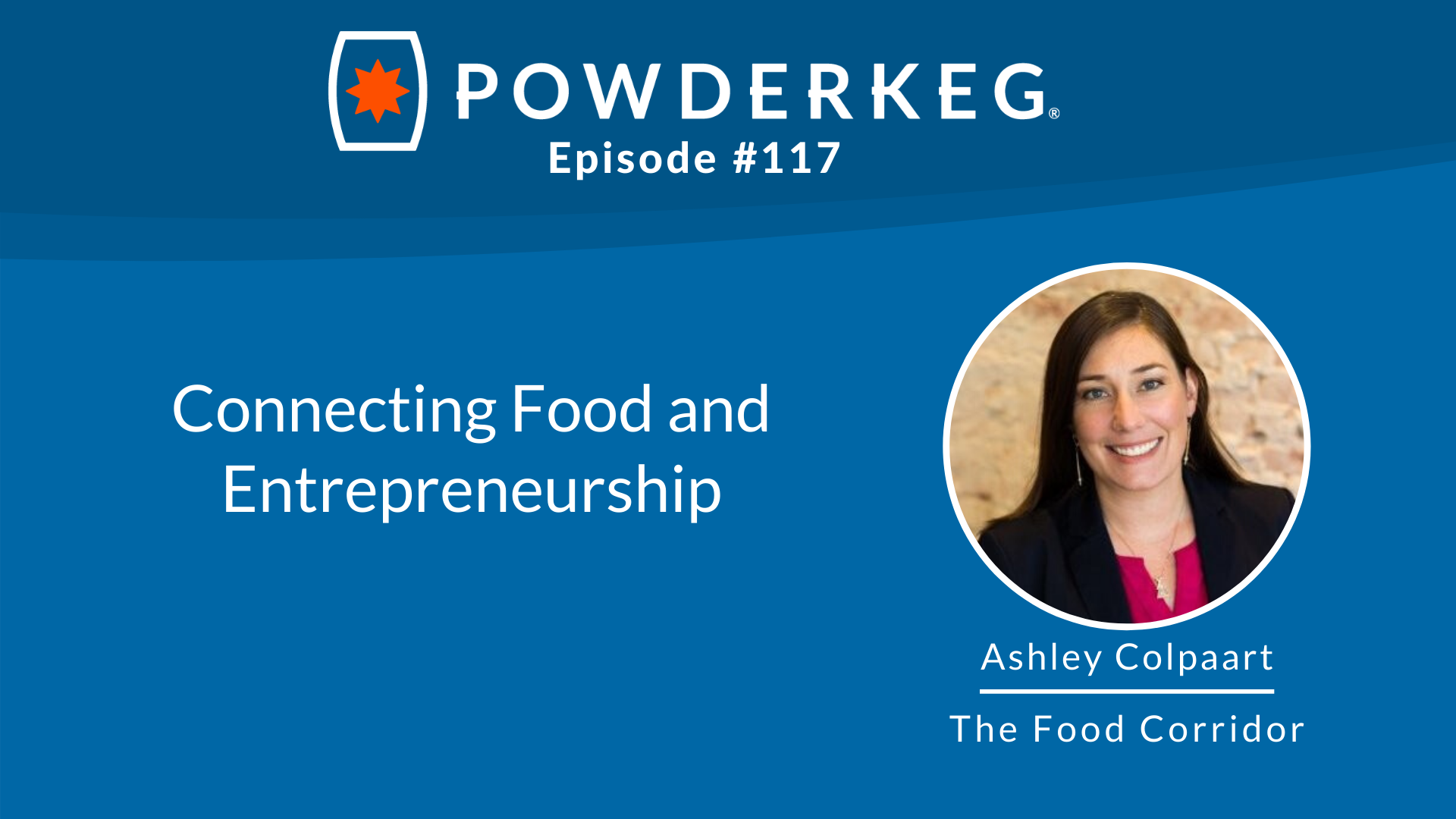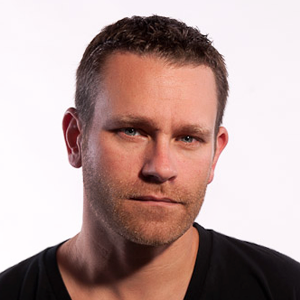Denver and Fort Collins for a longtime have been popular destinations for people across the country who are in search of beautiful scenery, fresh air, great food and healthy living. And over the past decade, the area has also become an amazing spot for entrepreneurs looking to build and launch their next great idea or even to find their next big investment. All I can say is… the Colorado tech scene is growing rapidly and it’s not looking to slow down anytime soon!

On today’s episode, we’ll be speaking with Ashley Colpaart. Ashley is a Registered Dietitian and earned her Doctorate in Food Systems from Colorado State University. She has a unique systems understanding of food and human health in social, economic, and environmental spheres. And is currently the founder and CEO of The Food Corridor, a platform that connects food entrepreneurs to commercial kitchen spaces.
In this episode Ashley shares her experiences of her journey into the world of entrepreneurship and how her experiences have influenced her as founder and CEO of The Food Corridor. Along with Ashley’s thoughts on the evolving influences of food entrepreneurship and how her company is becoming a leader in moving the shared kitchen industry forward. Tune in for more!
In this episode with Ashley Colpaart, you’ll learn:
- Ashley’s journey and experiences through entrepreneurship
- About the tech ecosystem in Fort Collins and Denver, Colorado
- How the The Food Corridor was founded and its goals for the future
- Ashley’s advice on raising capital as a beginning entrepreneur
Please enjoy this conversation with Ashley Colpaart!
- Listen to it on iTunes.
- Stream by clicking here.
- Download as an MP3 by right-clicking here and choosing “save as.”
If you like this episode, please subscribe and leave us a review on iTunes. You can also follow us on Soundcloud or Stitcher. We have an incredible lineup of interviews we’ll be releasing every Tuesday here on the Powderkeg Podcast.
Ashley Colpaart quotes from this episode of Igniting Startups:
“I was looking at commercial kitchens as the connection point between a food entrepreneur and legally producing food to sell to consumers. And so in doing that, I came up with a concept for Food Corridor and ended up making my dissertation research my proof of concept. So I made @ashleyrdtx on @PowderkegHQ [/ctt
Links and resources mentioned in this episode:
Companies and organizations:
Venture Capital Firms:
Conferences:
People:
A massive shout out and thank you to our friends over at Stout Street Capital, for inviting us to this year’s UNMET 2019 conference and for setting up this great opportunity to interview fellow entrepreneurs and innovators who are building and developing remarkable companies.
Did you enjoy this conversation? Thank Ashley Colpaart on Twitter!
If you enjoyed this session and have a few seconds to spare, let Ashley know via Twitter by clicking on the link below:
Click here to say hi and thank Raz on Twitter!
COMMENTS?
What stood out most to you about what Ashley Colpaart shares in this podcast?
For me, it’s Ashley’s advice on raising capital as a beginning entrepreneur.
You? Leave a comment below.
WANT MORE?
To subscribe to the podcast, please use the links below:
Click Here to Subscribe via iTunes.
Click Here to Subscribe via RSS (non-iTunes feed).
To download the PDF file for the full transcript of this podcast, please use the link below:
Click Here to Download PDF file
If you have a chance, please leave me an honest rating and review on iTunes by clicking here. It will help the show and its ranking in iTunes incredibly! Thank you so much!

Episode Transcript
This has actually turned into an opportunity for us to really be thought leaders in the space and to help communities identify what a shared kitchen is.
Nick Jamell 00:18
Either powder keg ban fans, Nick here from the powderkeg team. And this is episode 117 of powderkeg. Igniting startups, the show for entrepreneurs, leaders and innovators, building remarkable tech companies in areas outside of Silicon Valley. And today, we’re going to be looking at an interview I had the opportunity of hosting at this year’s unmet conference in Denver, Colorado. On today’s episode, I speak with Ashley Copart. And Ashley is a registered dietitian and earned her doctorate in food systems from Colorado State University. She has a unique systems understanding of food and human health, and social, economic and environmental spheres, and is currently the founder and CEO, CEO of the food corridor, a platform that connects food entrepreneurs to commercial kitchen spaces. And her products really cool. Her story is amazing. And it was a great interview. So let’s go ahead and get started playing out here talking to Ashley Copart, the founder and CEO of the food corridor, a platform that connects food entrepreneurs to commercial kitchen space. And so thank you for being on the podcast today with us, Ashley,
Ashley Colpaart 01:20
thanks for having me.
Nick Jamell 01:21
Awesome. Well, I guess really, what we’d like to start off on is getting your journey and how you got to where you are with the food corridor. But that really starts off with what got you in entrepreneurship. Why did you decide to go into this field as crazy it is, is there a moment or moments that got you there?
Ashley Colpaart 01:39
Probably a lot of moments. But um, so my mom was a food entrepreneur and growing up in Austin, Texas. So she started a hot sauce company when we were kids. And I remember she used to make it in our home kitchen. And oftentimes we’d have to wear swim goggles, because the peppers were so hot, she was making habanero sauce, and there was the first habanero sauce in the Austin area. And that was the first year they did the Texas hot sauce festival. So we ended up winning first place. And I was you know, child labor on the weekends working at farmer’s market selling hot sauce. And what we realized quickly, making this in our home kitchen is that there’s a level of scale that has to be realized in order for a food business to kind of make it to the next level. There were no commercial kitchens in our area in Texas. And so the company that we started and kind of fizzled out and never really was able to make it to that next phase. So I just remember that really clearly as being kind of the disappointing part of life. I ended up going into food for my career, I have a registered dietitian, and I have a master’s in food policy and Applied Nutrition. And then I came to Colorado to work on my PhD at Colorado State University where I studied food systems. And essentially, I was looking at underutilized assets in the food space, and how those assets could be leveraged to support local food economies. So specifically, I was looking at commercial kitchens as the connection point between a food entrepreneur and legally producing food to sell to consumers. And so in doing that, I came up with a concept for food corridor and ended up making my dissertation dissertation research my proof of concept. So I made my dissertation essentially work for me versus the other way around, and then launched food corridor. Right out of my PhD.
Nick Jamell 03:19
That’s awesome. That’s a really cool story. It’s
Ashley Colpaart 03:22
a unique one. Well,
Nick Jamell 03:24
that’s just cool to see. Like, I think there’s a lot of times when we talk to people, they have that story when their kid were parents or someone that they know, influenced them. I think that that’s really cool. To see. Um, so you kind of covered my next question was going to be how you got to, you know, the food corridor, but you kind of jumped ahead. So how are you enjoying? Then you said, you moved from Austin to here in Colorado? What’s the ecosystem? Like your How do you like it? You know, I mean, how’s that going?
Ashley Colpaart 03:50
Yeah, so I didn’t come from entrepreneurship. And so I, you know, quickly sought out the resources and the people that I needed to connect within this community. So the first time I ever pitched foo corridor was at 1 Million Cups in Fort Collins, which, you know, was the first time that I, you know, showed my idea to anybody and I got really great feedback from folks in the room. The next day, I pitched a pitch competition in Boulder and won first place, which sent me to San Francisco, which let me pitch again, there’s a huge community of, you know, pitch events and mentors, and opportunities to get in front of people in in Colorado, and the community has just been so supportive of what I’ve been doing from the very beginning. So I just cultivated a lot of relationships early on every time I pitched like a pitch competition, I would put those judges on my monthly update and ask for feedback and just constantly tried to, you know, hold myself accountable to the broader community so that you know if I ever needed them that I could pull pull on that community and it’s just been a really interesting journey, a very open, friendly and supportive community here in Colorado.
Clay Gordon 04:57
That’s awesome. Well, I guess One of my first questions is, you know, how do you use the product? Like what is what does it look like from the customer standpoint? And then also the person that owns the commercial kitchen?
Ashley Colpaart 05:09
Yeah, absolutely. So we are a software as a service platform for shared use kitchen. So think co working space in the food industry, you can picture a really large warehouse that has tons of prep tables, and hood vents and stove spaces that are broken off into stations. And those are individually individually rented out by different food businesses. And then the shared part of the facility is typically the shared storage, space, freezer space docking and that type of thing. So they’re basically these co working spaces. So the way the software works is we manage all of the internal operations. So the scheduling and booking compliance document management for the food businesses to make sure they’re legally producing in those kitchens, invoice generation and billing. So the big analogy we like to use of what we’re similar to is mind body in the healthcare space where they rent out yoga studios and interact with customers. We’re very similar platform, but just in the food industry.
Clay Gordon 06:08
Awesome. Well, that ties me to my next question of what are some of the challenges you face? I know, you kind of touched on regulation, but what are maybe some other challenges that you face just being in the food space? Yeah.
Ashley Colpaart 06:19
So we are in emerging part of the market. So what a shared kitchen is or what an incubator kitchen is, is still kind of being decided. So this, this actually turned into an opportunity for us to really be thought leaders in the space and to help communities identify what a shared kitchen is, folks that are looking to start shared use kitchens in their area, first have to land in the health department to get oversight for doing that. And oftentimes, the health department has no idea what a shared kitchen is, or how to regulate it. So what we do is provide resources to them so that the health department can write into their food code, how to properly regulate a shared use space. So a lot of the work heavy lifting we end up doing is kind of moving the industry forward into more formalized business. Awesome.
Nick Jamell 07:06
Yeah, that’s really interesting. That’s, I mean, I don’t think I had heard of really what a shared kitchen was until, you know, looking at what we’re owning the niche, our own in the niche. Yeah, that’s awesome. And that’s really great to see that you kind of turned that challenge of people don’t know what this is to really an opportunity and being the thought leader in the space, I think that’s really awesome. And obviously, you know, clay, and you actually know each other, how did you two meet, then, you know, you talked about connecting in the ecosystem here, what brought you together,
Clay Gordon 07:36
I can touch on it, from my perspective, we had saw you pitch and Boulder, and I really liked the concept, you know, really liked the innovative approach and really liked you as a manager. And, you know, we kind of talked about it a lot. And does the CEO with their background kind of, does it? Is it relevant for the problem that they’re solving. And we feel like that was a perfect fit with, with your background and the food corridor as well. And so it was one that you know, we just needed a little bit more familiarity with the company, just because shared kitchens was also very new for us. And, you know, I am a big believer in the update, because we track those and read them. And you guys definitely were progressing in the right way and wanted to be part of the team. So fortunate enough, we were able to join the team and be as helpful as possible. So
Ashley Colpaart 08:19
you can kind of nailed it. I mean, I was I was pitching up, you know, Boulder Angel Forum. And I’m fortunate that I you know, as a female founder, I raised all my seed round in Colorado and had some really great champions of what I was doing. And, you know, obviously the you get one domino with investors and the rest of them started falling. So I was able to be fortunate and bring some really great investors on our team.
Clay Gordon 08:43
Yeah, and I think some of the momentum that Ashley has had, has really kind of expanded nationwide. I think there’s some really exciting news. You had a new board member, a new participant, I’d love if you could just elaborate even on the story on how Walter Yeah.
Ashley Colpaart 08:57
So Walter, Rob and I met in Boulder at a, an event, and he was kind of, you know, next to the, the food table and I just, you know, made it made it a good opportunity for me to tell him what I was doing. We had some friends in common and just kind of noticed that and then I followed up with him just because I thought he thought what I was doing was interesting. And he ended up writing me back and saying, you know, where do you see yourself in three to five years? Are you are you raising money? And and, you know, what does your cap table look like? And it was like the fastest clothes that ever happened because he just really understood at a visceral level what we were doing and the innovative approach that we were taking, and he would, he’ll tell you, he just really liked me and it’s champion me and introduces me to all the right people. So Walter, who’s the former CEO of Whole Foods, now, you know, has a little bit more time on his hands. So he’s been able to kind of cultivate relationships with founders and really invest in what he sees is the next generation of food businesses and next generation of innovation. So we’re blessed and happy to have him involved with what we’re doing?
Clay Gordon 10:00
Yeah, I think it’s truly special to him and Bob as well. You know, I think a big component of the food corridors, there’s that education component to shared kitchens. But as I think the more people hear about it, they get a lot, they get really excited about it. So I guess for the listeners that want to get more information, how would the listener find out more information about the food corridor?
Ashley Colpaart 10:22
Sure. So obviously, www dot the food corridor.com Is our marketing website for our software. If you’re interested in finding a shared use commercial kitchen space in your area, or have underutilized commercial kitchen space that you want to post on our site. Our other site is the WWW dot the kitchen door.com. And that’s kind of the search tool for finding commercial kitchens. We also have a blog and a broader network called the network for incubator and commissary kitchens, which has 3000 members in a private Facebook group. So if you’re looking to start a kitchen or operating one and want to get yourself embedded into the community, feel free to join that. Awesome, awesome.
Clay Gordon 11:02
That’s all the questions I had, Nick. Yeah,
Nick Jamell 11:05
I think you covered it all. I mean, do we did you have anything else that you wanted to add to the audience, maybe even a piece of advice for you’ve gone through fundraising now? Is there a piece of advice that you have for an entrepreneur that’s looking to raise their first round of funding and just don’t know what to do?
Ashley Colpaart 11:19
Um, I think that fundraising is a people business, and that you want to surround yourself with good people that really believe in you. But that also can bring resources to you when you need them and be able to have like a really honest talk about when things are going well. But more importantly, when things aren’t going well. And that you want to feel like your investors are behind you in there to support you. So I would say, you know, don’t don’t take a cheque just because somebody is writing it, really do your own diligence with the with the investors and make sure that they are the right people you want on your team. Because as they say, it’s like marriage, probably even harder to get out of that relationship. But you really want good people, surround yourself with good people, and good things happen. Awesome.
Clay Gordon 11:59
Yeah. And I will say from the investor point of like, we really echo that as well, you know, we get a lot of confidence when the company kind of pushes back on the investor and asks questions, we just feel like it comes across as experienced, I would say careful and in the right way. But we we really value that as well. So if a I would say if a company’s very eager to get funding, it’s it doesn’t bode as well on the confidence spectrum as someone that’s more willing to kind of make it a relationship. So we echo that.
Nick Jamell 12:28
Yeah. That’s awesome. Well, thank you to you for helping us out today and for coming on the podcast. I’m so it’s really nice to meet you, Ashley, you too. Thanks again for listening to today’s episode. If you have any thoughts or feedback on the conversation with Ashley, feel free to let us know in the comments. We’d love to hear from you. And as always to be among the first to hear the stories about entrepreneurs, investors and other tech leaders outside of Silicon Valley. Subscribe to us on iTunes App powderkeg.com forward slash iTunes. We’ll catch you next time on powderkeg igniting startups




